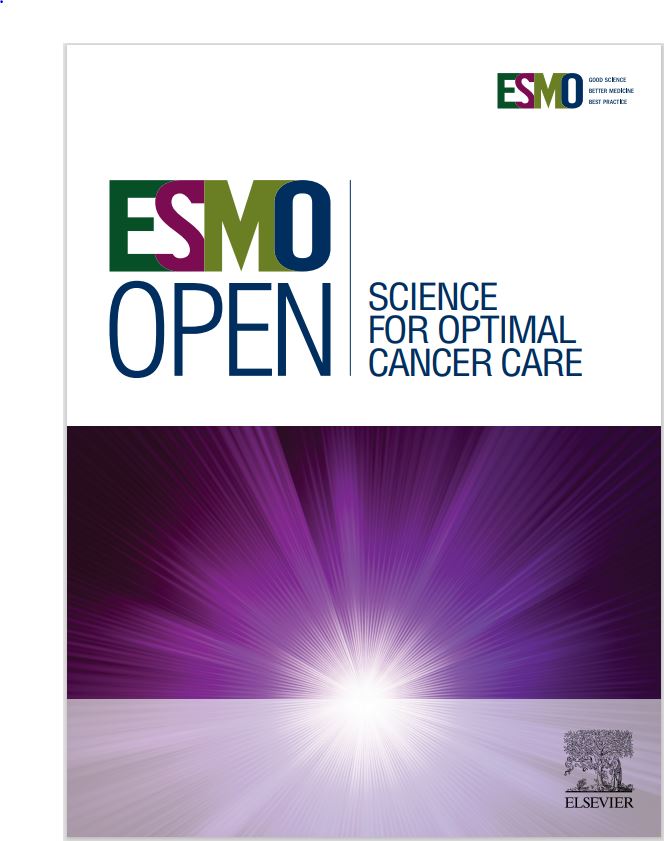Comparative overall survival of CDK4/6 inhibitors plus an aromatase inhibitor in HR+/HER2− metastatic breast cancer in the US real-world setting☆
IF 7.1
2区 医学
Q1 ONCOLOGY
引用次数: 0
Abstract
Background
Randomized controlled trials have shown inconsistent overall survival (OS) benefit among the three cyclin-dependent kinase 4/6 inhibitors (CDK4/6i) as first-line (1L) treatment of patients with hormone receptor-positive (HR+)/human epidermal growth factor receptor 2-negative (HER2−) metastatic breast cancer (mBC). Several real-world studies compared CDK4/6i effectiveness, with inconsistent findings. This study compared overall survival (OS) of patients with HR+/HER2− mBC receiving 1L palbociclib, ribociclib, or abemaciclib, in combination with an aromatase inhibitor (AI), in US clinical practice.
Patients and methods
This retrospective study used real-world data from the Flatiron Health electronic health record-derived deidentified longitudinal database. Patients with HR+/HER2− mBC aged ≥18 years at mBC diagnosis started 1L CDK4/6i therapy (index treatment) between February 2015 and November 2023, with a potential ≥6-month follow-up. OS was defined as months from start of index treatment to death. Stabilized inverse probability of treatment weighting (sIPTW; primary analysis) was used to balance baseline patient characteristics. Multivariable Cox proportional hazards model was carried out as a sensitivity analysis.
Results
Of 9146 eligible patients, 6831, 1279, and 1036 received palbociclib plus AI, ribociclib plus AI, or abemaciclib plus AI, respectively. After sIPTW, baseline characteristics were balanced between treatment groups. After sIPTW, no significant OS differences were found between treatment groups [ribociclib versus palbociclib: adjusted hazard ratio (aHR) 0.98, 95% confidence interval (CI) 0.87-1.10, P = 0.7531; abemaciclib versus palbociclib: aHR 0.95, 95% CI 0.84-1.08, P = 0.4292; abemaciclib versus ribociclib: aHR 0.97, 95% CI 0.82-1.14, P = 0.6956]. Sensitivity analysis including a subanalysis of patients who started index treatment in 2017 or later also showed no significant OS differences between treatment groups.
Conclusions
This large real-world study suggested that there were no significant OS differences between 1L ribociclib, abemaciclib, and palbociclib in combination with an AI for patients with HR+/HER2− mBC. These findings together with other factors such as safety and quality of life are helpful in the selection of CDK4/6i combination therapy for patients with HR+/HER2− mBC.
CDK4/6抑制剂加芳香化酶抑制剂治疗HR+/HER2-转移性乳腺癌在美国现实环境中的总生存率比较
背景:随机对照试验显示,三种细胞周期蛋白依赖性激酶4/6抑制剂(CDK4/6i)作为激素受体阳性(HR+)/人表皮生长因子受体2阴性(HER2-)转移性乳腺癌(mBC)患者的一线(1L)治疗,总生存(OS)获益不一致。一些真实世界的研究比较了CDK4/6i的有效性,结果不一致。该研究比较了美国临床实践中HR+/HER2- mBC患者接受1L palbociclib, ribociclib或abemaciclib联合芳香酶抑制剂(AI)的总生存期(OS)。患者和方法:本回顾性研究使用了来自Flatiron Health电子健康记录衍生的未识别纵向数据库的真实数据。在2015年2月至2023年11月期间,年龄≥18岁的HR+/HER2- mBC患者开始了1L CDK4/6i治疗(指数治疗),随访时间可能≥6个月。OS定义为从开始指标治疗到死亡的月数。处理加权稳定逆概率;初步分析)用于平衡基线患者特征。采用多变量Cox比例风险模型进行敏感性分析。结果:在9146例符合条件的患者中,分别有6831例、1279例和1036例接受了palbociclib + AI、ribociclib + AI或abemaciclib + AI。sIPTW后,各组间基线特征平衡。sIPTW后,两组间OS无显著差异[核博西尼vs帕博西尼:校正风险比(aHR) 0.98, 95%可信区间(CI) 0.87-1.10, P = 0.7531;abemaciclib vs palbociclib: aHR 0.95, 95% CI 0.84-1.08, P = 0.4292;abemaciclib与ribociclib: aHR 0.97, 95% CI 0.82-1.14, P = 0.6956]。敏感性分析包括2017年或之后开始指数治疗的患者的亚分析也显示治疗组之间没有显着的OS差异。结论:这项大型现实世界研究表明,1L ribociclib、abemaciclib和palbociclib联合AI治疗HR+/HER2- mBC患者的OS无显著差异。这些发现以及其他因素,如安全性和生活质量,有助于选择CDK4/6i联合治疗HR+/HER2- mBC患者。
本文章由计算机程序翻译,如有差异,请以英文原文为准。
求助全文
约1分钟内获得全文
求助全文
来源期刊

ESMO Open
Medicine-Oncology
CiteScore
11.70
自引率
2.70%
发文量
255
审稿时长
10 weeks
期刊介绍:
ESMO Open is the online-only, open access journal of the European Society for Medical Oncology (ESMO). It is a peer-reviewed publication dedicated to sharing high-quality medical research and educational materials from various fields of oncology. The journal specifically focuses on showcasing innovative clinical and translational cancer research.
ESMO Open aims to publish a wide range of research articles covering all aspects of oncology, including experimental studies, translational research, diagnostic advancements, and therapeutic approaches. The content of the journal includes original research articles, insightful reviews, thought-provoking editorials, and correspondence. Moreover, the journal warmly welcomes the submission of phase I trials and meta-analyses. It also showcases reviews from significant ESMO conferences and meetings, as well as publishes important position statements on behalf of ESMO.
Overall, ESMO Open offers a platform for scientists, clinicians, and researchers in the field of oncology to share their valuable insights and contribute to advancing the understanding and treatment of cancer. The journal serves as a source of up-to-date information and fosters collaboration within the oncology community.
 求助内容:
求助内容: 应助结果提醒方式:
应助结果提醒方式:


